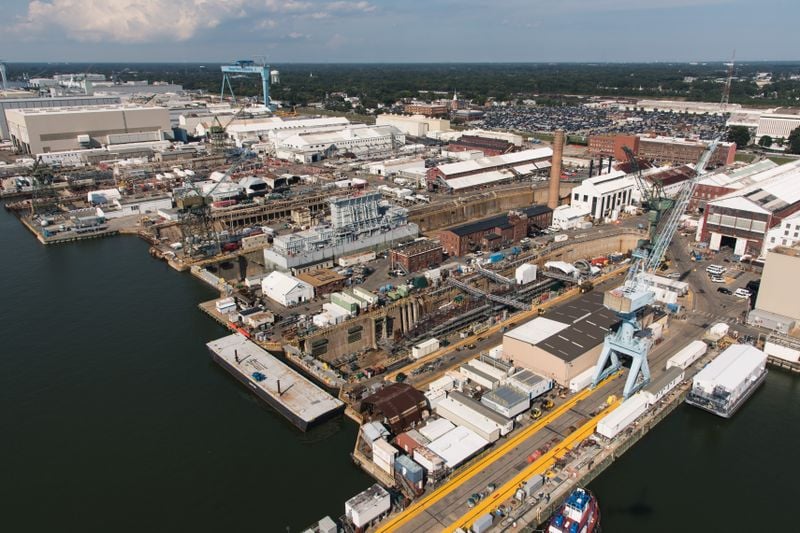Fewer than two dozen shipyard workers are responsible for suspicious welds that were discovered on aircraft carriers and submarines built at HII’s Newport News Shipbuilding, company officials said during an earnings call for the shipbuilder on Thursday.
Company leaders in the earnings call framed the suspicious welds, made on Ford and Nimitz-class aircraft carriers and Columbia and Virginia-class submarines, as the a result of a small subset of workers in the yard.
“This is a process issue. This is a small fraction of some welders in the yard and a small fraction of welds that were impacted,” HII CEO Christopher Kastner said on the earnings call.
“We’re working very closely with the customer to bound the issue and come through the issue, and we think we’ll march through that very smartly.”
The suspicious welds have been found aboard Nimitz-class aircraft carrier USS George Washington (CVN-73), the Virginia-class attack submarines USS Hyman G. Rickover (SSN-795) and USS New Jersey (SSN-796) and up to 23 other ships built at the Virginia shipyard.
“An initial assessment at Newport News Shipbuilding determined that fewer than two dozen welders did not consistently follow procedures in their weld process,” said HII’s chief financial officer Thomas Stiehle.
“We continue to work alongside with the Navy through a comprehensive investigation and analysis to determine the extent of any financial impact.”
The Navy and the shipyard are continuing to assess the extent of the weld problems. A Navy official told USNI News that tens of thousands of welds needed to be inspected but did not say how many need to be repaired or reworked.
Naval Sea Systems Command officials have been on Capitol Hill this week briefing legislators on the extent of the issue, two defense officials confirmed to USNI News. Members of Congress have asked the Navy for updates on the severity of the issue, when the service became aware of the problem and the scope of an ongoing Department of Justice investigation into the work.
In a Thursday statement, a service spokesperson told USNI News, “the Navy is continuing to oversee and independently validate HII-NNS’s initial weld assessments, which are approximately 90 percent complete. To date, five ships have been cleared safe for full operation.
Later in the call, company officials lowered earnings projections for the year due to the delay in the Navy awarding contracts for 17 submarines that were supposed to be issued earlier this year.
Newport News Shipbuilding builds the bows and sterns of both the Virginia and Columbia-class submarines in a teaming arrangement with prime contractor General Dynamics Electric Boat.

The 17-boat contract includes multi-year deals for 10 Block VI Virginia-class attack submarines and five Build II Columbia-class boomers, in addition to two Block V boats that Congress appropriated $9.34 billion for as part of the Fiscal Year 2024 defense spending bill. However, during the negotiations for the Block V boats – the future Baltimore (SSN-812) and Atlanta (SSN-813) – the Navy realized the price tag would increase by 20 percent mostly due to increased workforce costs.
To make up for the cost difference the Navy developed a payment scheme called the Shipbuilder Accountability and Workforce Support plan, also known as SAWS, that would move workforce money from existing submarine contracts that have been awarded, but have not started construction to create a pool of money to pay for labor cost increases and infrastructure improvements.
“[SAWS] was a Navy initiative that we supported. I still believe it’s the smartest, best way to get at this issue because it unlocks such investment in the workforce, the infrastructure and technology,” Kastner said.
“It was a very good idea that we think is still under review and potentially could be put under contract, although we don’t forecast that happening over the balance of this year.”
Kastner said during the call that balancing the submarine workload was key to the ongoing contract negotiations.
“When you think about the 17 submarines, it’s really a reset of the portfolio. In Newport News, this is not business as usual. You can’t simply just put that much work into a facility and expect it to be executed –especially in this environment that we’re operating in – relative to labor and the supply chain and the capacity in the industrial base,” he said during the call.
“It does none of us any good to agree to cost or schedules on these submarines that are so urgently needed that we can’t achieve.”
Earlier this week, a bipartisan group in the Senate wrote to Secretary of the Navy Carlos Del Toro asking for the status of the SAWS plan.
“The Navy’s hesitance to both notify Congress earlier and take a definitive stance is concerning … We, therefore, urge more consistent communication with Congress and with [White House Office of Management and Budget] so that all parties clearly understand the Navy’s position on SAWS and overall plans to get our nation’s submarine production on track,” reads the letter to Del Toro.
“It is critical that our submarine programs be on schedule and on budget. The news that the Navy is projected to be an astonishing $17 billion short in the Virginia-class program alone in the next six years is especially distressing.”
In addition to the contract funding, Kastner also said HII is struggling with a green labor force and is shifting to hire more experienced labor to prevent the shipbuilder from having to redo work done by less experienced employees.
“We’re going to focus on more experienced labor, because we’re just out of alignment, or out of balance from an experience level right now, which leads to rework, which leads to inefficiency, and it’s not good for anyone,” he said.
“We just encountered rework on systems that we didn’t expect and that impacts schedule.”









